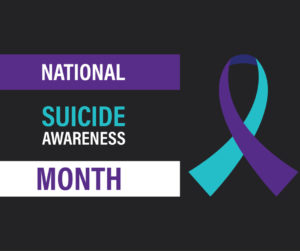National Suicide Prevention Month: Not Alone in 2020

This article is by Matt Berry and published by the American Addiction Centers
September is National Suicide Prevention Month, and after a summer characterized by isolation, social unrest, financial strain, political division, and a startling loss of life due to Covid-19, this National Suicide Prevention Month should remind us all that we’re not experiencing these times alone. While some individuals may feel the effects of the present climate more intimately, we’re all weathering the same storm.
Suicidal thoughts can happen to anyone, regardless of their race, wealth, age, or gender. In this way, suicidal thoughts are not uncommon. However, suicidal ideation should never be normalized, as the act of suicide is usually related to an undiagnosed mental health concern. Unfortunately, these mental health conditions – not surprisingly – have seen a sharp, correlative rise with Covid-19 and its rippling effects on everyday life. It is amidst this backdrop that suicide prevention resources are becoming all the more necessary.
The Situation in 2020
According to a recent study by the Center of Disease Control and Prevention, 40% of U.S. adults reported struggling with mental health or substance use in June of 2020. Of these adults, the study noted a 31% increase of symptoms related to anxiety disorder and depressive disorders, compared to a similar study conducted in 2019. In addition, 11% of the survey’s respondents reported they had seriously considered suicide in the last 30 days.
Unfortunately, the largest subgroup who reported seriously considering suicide (roughly 1 in 4) were young adults between the ages of 18 and 24. In addition, more than half (62.9%) of this demographic reported struggling with symptoms of an anxiety or depressive disorder. While the pandemic has certainly accelerated suicide ideation among young adults, suicide was already the second-leading cause of death among individuals aged 10 to 34.
For all age groups, people have undeniably felt more isolated lately. Although stay-at-home orders and social distancing protocols have proven effective in slowing the spread of the coronavirus, these methods have presented mental, social, and spiritual challenges for many. Simply put, when someone feels more socially detached, social resources seem increasingly unavailable.
A social resource could be attending a religious service, playing in a sports league, working out at a neighborhood gym, or visiting with loved ones and friends in person. Human beings are social by nature. Needless to say, these familiar social supports were quickly upended – or at least significantly altered – for millions of people in 2020.
National Suicide Prevention Month 2020
This year, National Suicide Prevention Month is a timely reminder that there are social supports, especially for those struggling with a mental health crisis. If you or someone you know is contemplating suicide, feels overwhelmed, or is experiencing emotional distress, the National Suicide Prevention Lifeline, at 800-273-8255, provides free, nationwide support and recommendations to local mental health resources. If you or someone you know is experiencing an emergency, call 911 immediately.
Not only does Suicide Prevention Awareness Month encourage individuals to share personal messages of strength and hope; it also invites individuals to share their stories of grief, uncertainty, and loss without judgement or stigma. It’s worth recognizing that, for some, expressing their anxiety or depression may be a vital, lifesaving first step to recovery.
The National Alliance on Mental Illness is now collecting stories through their “You Are Not Alone” campaign. These stories may be selected for various NAMI awareness campaigns and initiatives. In addition, NAMI moderates Ok2Talk, an online community for teens and young adults struggling with mental health concerns. At Ok2Talk, individuals can post stories of “recovery, tragedy, struggle, or hope.”
Further Suicide Prevention Resources
For further suicide prevention resources, the Substance Abuse and Mental Health Services Administration (SAMHSA) has just released its Suicide Prevention Month Ideas for Action, which offers suicide prevention models, risk assessment toolkits, and links to messaging platforms. Whether you’re a mental health profession or a concerned loved one, these resources provide professional insights to the suicide epidemic. To promote suicide prevention awareness in September, you can also use the hashtags #SPM20, #NotAlone, and #BeThere to share personal stories or messages of hope and support.
While suicide prevention is an everyday, year-long effort, this Suicide Prevention Awareness Month may be the most impactful since its conception. Whether we’re offering an umbrella to another or requesting one for ourselves, admitting we’ve all felt the storm of 2020 is simply the month’s intent – an awareness.